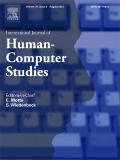
INTERNATIONAL JOURNAL OF HUMAN-COMPUTER STUDIES
Scope & Guideline
Exploring the Nexus of Humanity and Technology
Introduction
Aims and Scopes
- Human-Computer Interaction Research:
The journal emphasizes rigorous empirical studies that investigate how users interact with computer systems, including usability, user experience, and interaction design methodologies. - Emerging Technologies and Interfaces:
Research focusing on novel interfaces and technologies, such as virtual reality (VR), augmented reality (AR), and artificial intelligence (AI), is a significant aspect of the journal, examining their implications for user interaction. - User-Centered Design and Evaluation:
A strong focus on user-centered design principles and evaluation techniques, ensuring that technological innovations are developed with the needs and capabilities of users in mind. - Social and Ethical Implications of Technology:
The journal also addresses the broader social and ethical implications of technology adoption, particularly concerning privacy, trust, and the impact on human behavior and society. - Interdisciplinary Approaches to HCI:
Encouraging interdisciplinary research that combines insights from psychology, cognitive science, design, and computer science to enhance understanding of user interactions.
Trending and Emerging
- AI and Human-AI Interaction:
There is a growing emphasis on understanding and designing for human-AI interaction, particularly in how AI systems can enhance user experiences and decision-making processes. - Augmented and Virtual Reality Applications:
Research on augmented and virtual reality is increasingly prevalent, exploring innovative applications for education, therapy, and social interaction, highlighting their immersive potential and user engagement. - Mental Health and Well-being Technologies:
Emerging studies focus on the design and evaluation of technologies aimed at improving mental health and well-being, reflecting a societal shift towards prioritizing mental health in technology development. - User Experience in Remote and Hybrid Work:
With the rise of remote and hybrid work environments, research exploring user experience in digital collaboration tools and virtual meeting platforms is becoming increasingly relevant. - Ethics and Privacy in HCI:
There is a noticeable trend towards investigating ethical considerations and privacy impacts of emerging technologies, especially concerning data usage and user trust in automated systems.
Declining or Waning
- Traditional Usability Studies:
There appears to be a waning interest in purely traditional usability studies that do not incorporate emerging technologies or innovative interaction paradigms, as researchers are now more inclined to explore dynamic and context-sensitive usability. - Static User Interface Design:
Research focusing solely on static user interface design principles is declining, with a shift towards more dynamic, interactive, and adaptive user interfaces that respond to user behavior and context. - Basic Interaction Techniques:
Simple interaction techniques, such as basic mouse and keyboard interfaces, are less frequently explored, as the field moves towards more complex interactions involving gestures, voice, and AI-driven interfaces. - Single-Disciplinary Focus:
There is a noticeable decrease in studies that do not incorporate interdisciplinary perspectives, with a trend towards research that combines insights from multiple fields, such as psychology, AI, and design. - Prevalent Use of Established Frameworks:
The reliance on established HCI frameworks without adaptation or innovation is declining, as researchers seek to develop new frameworks that better address contemporary challenges in technology.
Similar Journals
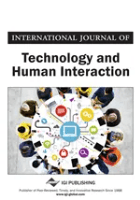
International Journal of Technology and Human Interaction
Navigating the Future of Technology and Human ConnectionInternational Journal of Technology and Human Interaction, published by IGI Global, serves as a critical platform for the exploration of the intersection between technology and human behavior, offering an interdisciplinary lens on topics within the realms of Human-Computer Interaction and Information Systems. With an ISSN of 1548-3908 and an E-ISSN of 1548-3916, this journal has been contributing to scholarly discourse since its inception in 2005, with ongoing publication until 2024. Hosting a diverse range of research articles, case studies, and reviews, the journal aims to advance the understanding of how technology influences human experience and interaction patterns in various contexts. Although currently positioned in the Q4 quartile of both Human-Computer Interaction and Information Systems categories, the journal fosters knowledge that aspires to redefine scope and standards within the field. Its commitment to quality research is reflected in its Scopus rankings, showcasing its relevance despite its emerging status in academia. Targeting researchers, professionals, and students alike, the International Journal of Technology and Human Interaction invites contributions that address the pressing challenges and innovations at the nexus of technology and human interaction.

Journal of Usability Studies
Empowering usability professionals with cutting-edge insights.The Journal of Usability Studies, published by the USERS EXPERIENCE PROFESSIONAL ASSOCIATION, is a pivotal platform for researchers and professionals dedicated to advancing the field of usability and user experience design. With an ISSN of 1931-3357, this journal offers a collection of peer-reviewed articles that explore innovative methodologies, emerging technologies, and applied research in usability studies. Though it operates under a traditional access model, the journal remains dedicated to fostering a detailed understanding of how users interact with systems and products. The Journal of Usability Studies is instrumental for those aiming to enhance user satisfaction through research-backed insights, making it a vital resource for academics, practitioners, and students seeking to contribute to the evolving discourse in human-computer interaction and usability engineering.

Visual Informatics
Bridging Creativity and ComputationVisual Informatics is a premier academic journal published by Elsevier, dedicated to advancing the fields of computer graphics, computer-aided design, and human-computer interaction. Since its launch in 2017, this Open Access journal has swiftly established itself as a leading platform for innovative research, reflected in its impressive impact factor and robust rankings in various Scopus categories. In 2023, it proudly holds positions in the top quartile (Q1) for Computer Graphics and Computer-Aided Design, Human-Computer Interaction, and Software, showcasing its influential contributions to these dynamic fields. Based in Amsterdam, Netherlands, Visual Informatics encourages the dissemination of high-quality, peer-reviewed articles that explore the intersection of visual technology and user experience, serving as an invaluable resource for researchers, professionals, and students seeking to stay at the forefront of these evolving disciplines.

ACM Transactions on Applied Perception
Transforming Perceptual Research into Practical ApplicationsACM Transactions on Applied Perception is a leading journal published by the Association for Computing Machinery, focusing on the intersection of perception science and computational methods. With an ISSN of 1544-3558 and an E-ISSN of 1544-3965, this esteemed publication has been a vital resource for innovators and researchers since its establishment in 2004. It operates within the ambit of Computer Science and the realms of Experimental and Cognitive Psychology, boasting a commendable impact factor and category rankings, including Q2 in Computer Science (miscellaneous) and Q3 in both Experimental and Cognitive Psychology and Theoretical Computer Science. The journal's scope encompasses a plethora of studies aimed at understanding human perception through computational lenses, making it an essential platform for scholarly exchange. Although it does not currently offer an Open Access option, its extensive reach and rigorous peer-review process ensure high visibility and impact in the academic community. By fostering collaboration across disciplines, ACM Transactions on Applied Perception encourages advancements that bridge perceptual research with practical applications, making it invaluable for researchers, professionals, and students engaged in this dynamic field.
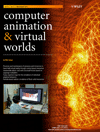
COMPUTER ANIMATION AND VIRTUAL WORLDS
Unleashing Potential in Animation and Virtual Environments.COMPUTER ANIMATION AND VIRTUAL WORLDS, published by Wiley, is a pivotal journal in the fields of Computer Graphics and Computer-Aided Design, as well as Software. With a focus on the intersection of technology and creativity, the journal provides a platform for researchers and professionals to share innovative studies, new methodologies, and insights that shape the future of computer animation and virtual environments. Currently holding a Q2 category in Computer Graphics and a Q3 in Software for 2023, it ranks #63 out of 106 in its niche, highlighting its influence and relevance in the academic community. Though the journal operates under a subscription model, it also offers options for open access, ensuring that a broader audience can engage with groundbreaking research. The journal has been publishing continuously since its inception in 2004 and looks forward to further contributions as it moves towards its 20th anniversary in 2024. Whether you are a seasoned researcher, an industry professional, or a student eager to explore these dynamic fields, COMPUTER ANIMATION AND VIRTUAL WORLDS is an essential resource for advancing knowledge and innovation.

Frontiers in Virtual Reality
Advancing Knowledge in Virtual EnvironmentsFrontiers in Virtual Reality, published by FRONTIERS MEDIA SA, is a leading open-access journal that has been at the forefront of the burgeoning field of virtual reality since its establishment in 2020. Based in Lausanne, Switzerland, this journal provides a vital platform for researchers, professionals, and students eager to explore and disseminate innovative findings related to virtual environments, immersive technologies, and human-computer interaction. With a commendable 2023 ranking placing it in the Q2 quartiles across prestigious categories such as Computer Graphics, Computer-Aided Design, and Human-Computer Interaction, the journal is highly regarded for its rigorous peer-review process and commitment to promoting scholarly communication. Frontiers in Virtual Reality not only advances the understanding of immersive experiences but also encourages interdisciplinary research that bridges the gaps between technology and human interaction. As an essential source of knowledge and a discussion forum for cutting-edge advances, this journal continues to shape the future of virtual reality research with easily accessible content and a responsive editorial approach.
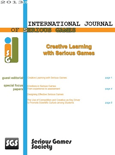
International Journal of Serious Games
Exploring Innovative Applications of Serious GamesThe International Journal of Serious Games is a pioneering publication dedicated to advancing the interdisciplinary field of serious games and their application in various domains such as education, artificial intelligence, and human-computer interaction. Published by SERIOUS GAMES SOC in Italy, this Open Access journal has been facilitating unrestricted access to innovative research since 2014. The journal is recognized for its quality, achieving prominent rankings in its categories, including Q2 in Education and Q2 in Computer Graphics and Computer-Aided Design as of 2023. With its commitment to academic rigor, it places itself as an essential resource for researchers, professionals, and students seeking to explore the transformative potential of serious games. Housed at the IST INT COMUNICAZIONI, VILLA PIAGGIO, GENOA, the journal continues to foster knowledge sharing and collaboration across disciplines, enriching the global discourse on gaming for impact.
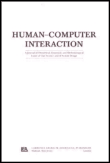
HUMAN-COMPUTER INTERACTION
Innovating the Way We Connect with ComputersHUMAN-COMPUTER INTERACTION is a premier academic journal published by Taylor & Francis Inc, dedicated to the interdisciplinary field of HCI, which explores the dynamic interactions between humans and computers. With its ISSN 0737-0024 and E-ISSN 1532-7051, the journal maintains a strong presence within the academic community and is recognized for its significant impact, holding a commendable impact factor that underscores its relevance. Ranked in the Q1 category for both Applied Psychology and Human-Computer Interaction, it occupies a critical position in Scopus rankings, listed as #15 in Applied Psychology and #11 in Computer Science, Human-Computer Interaction, placing it in the top 6% of relevant fields. Covering a broad spectrum of topics from usability studies to user experience design, the journal aims to facilitate innovative research and provide insights that bridge theoretical frameworks and practical applications. Published since 1985 and continuously evolving, HUMAN-COMPUTER INTERACTION remains an essential resource for researchers, professionals, and students eager to contribute to and benefit from advances in understanding how technology can effectively serve human needs.
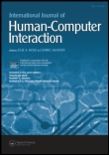
INTERNATIONAL JOURNAL OF HUMAN-COMPUTER INTERACTION
Elevating Human-Centric Design and ResearchINTERNATIONAL JOURNAL OF HUMAN-COMPUTER INTERACTION, published by Taylor & Francis Inc, stands at the forefront of research within the interdisciplinary fields of human-computer interaction, human factors, and ergonomics. Since its establishment, the journal has consistently contributed to advancing the understanding of the interactions between people and computers, making it a vital resource for researchers, professionals, and students alike. With an impressive impact factor reflecting its high citation rate, this journal is recognized as a Q1 publication in both Computer Science Applications and Human Factors and Ergonomics categories for 2023, showcasing its stature within the academic community. Additionally, it boasts a commendable ranking within the top percentiles in key areas on Scopus, ensuring that the research published here reaches broad scholarly audiences. Available in traditional subscription format, the journal covers seminal studies from 1989 to 2024, reflecting ongoing innovation in technology and its applications in everyday life, and thus serves as an essential platform for pioneering research that shapes the future of user experience.

ACM Transactions on Human-Robot Interaction
Exploring Innovative Interactions Between Humans and Machines.ACM Transactions on Human-Robot Interaction, published by the Association for Computing Machinery, is a premier journal dedicated to advancing the field of human-robot interaction, a critical area within artificial intelligence and human-computer interaction. With a high impact factor and esteemed rankings, including Q1 in both Artificial Intelligence and Human-Computer Interaction, this journal serves as a vital platform for researchers, practitioners, and students aiming to explore innovative designs, methodologies, and applications that enhance the integration of robots in our daily lives. Covering research from 2018 to 2024, the journal encourages submissions that push the boundaries of knowledge and technology, contributing to the burgeoning dialogue on how robotics can be effectively and ethically integrated into human environments. Despite operating under a traditional access model, the journal's scholarly contributions play a crucial role in shaping the future of intelligent systems, making it an invaluable resource for anyone aiming to understand and influence the interaction between humans and machines.